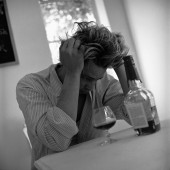Dual Diagnosis: Recovering from Mental Illness and Addiction
Recovering from a serious mental illness can seem impossible, insurmountable at times, and frightening as well. Because I was diagnosed with bipolar disorder at the age of twelve, drugs and alcohol became a way in which I worked to forget about the diagnosis and self-medicate it.

My addiction was triggered by the suicide of my best friend, he was bipolar as well, and we had consistently supported each other. For better or for worse, we held hands during the rough times, and smiled when things went smoothly. And then he was gone. Just like that.
Shortly after, I started drinking, and not long after that, I was abusing drugs on a daily basis. I dropped out of college, and found myself having seizures and waking up after an overdose in the hospital, strapped down with electrodes. Nude, save for a thin sheet. I was a very sick girl for over four years. During these years, I took my psychiatric medication, but because I was an addict it made me sicker.
Drugs and alcohol do not mix with medication. This is common knowledge, but not to an addict who cannot stop to think. Stimulants caused hypo-manic episodes, and alcohol plunged me into deep depression. My experience is very raw, and the reason I am talking about it so openly is because it is important that those who live with a mental illness understand that recovery is impossible if you are abusing drugs and alcohol. You cannot recover. And that is what this blog is about: Recovery.
Why People With a Mental Illness Self-Medicate
Using bipolar disorder as an example: the illness is defined by cyclical highs and lows. If you are feeling as if you might be getting a bit speedy, sleeping less, and your body cannot keep up with your mind, alcohol is a central nervous system depressant and can slow down your mind and body. If you are feeling depressed, a stimulant might make you feel better, open your eyes, and wake you up. Those of us who struggle with chronic mental illness might be drawn to these substances because they feel they control their mood. This is why people with mental illness have a much higher rate of addiction (20% of patients): we are trying to escape pain and you cannot really blame us, mental illness can be painful, and we might grasp onto anything that can make us feel better. But this doesn't work. Addiction makes us sicker. It makes our lives unmanageable and frightening. It is a horrible disease on it's own, but when combined with mental illness, it can be deadly.
Recovering from Mental Illness and Addiction
It is important to note that not everyone who has a chronic mental illness abuses substances. The majority do not. But if you do, recovering from addiction is as important as recovering from mental illness. I have been sober for over three years now, but it has, to say the least, been an uphill battle. At some point, I realized that I could not acheive stability if I did not stop using..
Deciding to address and treat the issue of addiction, recovery from it, involves an immense amount of support. Many people recover, albeit slowly, by connecting with others in the community who are battling both illnesses. Combating addiction and working to acheive wellness and stability, can feel impossible and that is why it's important to take small steps: find a support network, work with your psychiatrist and, above all, remember that recovery is possible.

Once you have found it, worked to acheive it, you have found freedom.
You can find yourself.
APA Reference
Jeanne, N.
(2011, September 22). Dual Diagnosis: Recovering from Mental Illness and Addiction, HealthyPlace. Retrieved
on 2026, January 9 from https://www.healthyplace.com/blogs/recoveringfrommentalillness/2011/09/dual-diagnosis-recovering-from-mental-illness-and-addiction
Author: Natalie Jeanne Champagne
This is so true! Realizing it and working towards that goal is a difficult thing. Sometimes drinking or using is the only thing that seems to keep me from breaking down. I know this is backwards thinking but it seems to be a driving factor in keeping me using. I hope I find the power to overcome that way of life and work towards recovery.
Hi, Dan:
Thank you for the comment. I felt the same way for years. Drinking and using really was, I thought, the only way to control how I felt. And it worked. For a while. Until my life fell apart. That's the problem: initially it makes you feel better and then your life will fall apart. That is the frightening reality of the illness. That makes it hard to stop using. I really hope you can work toward a sober life. It's hard, one of the hardest things I have had to do, but it's possible!
Sincerely,
Natalie